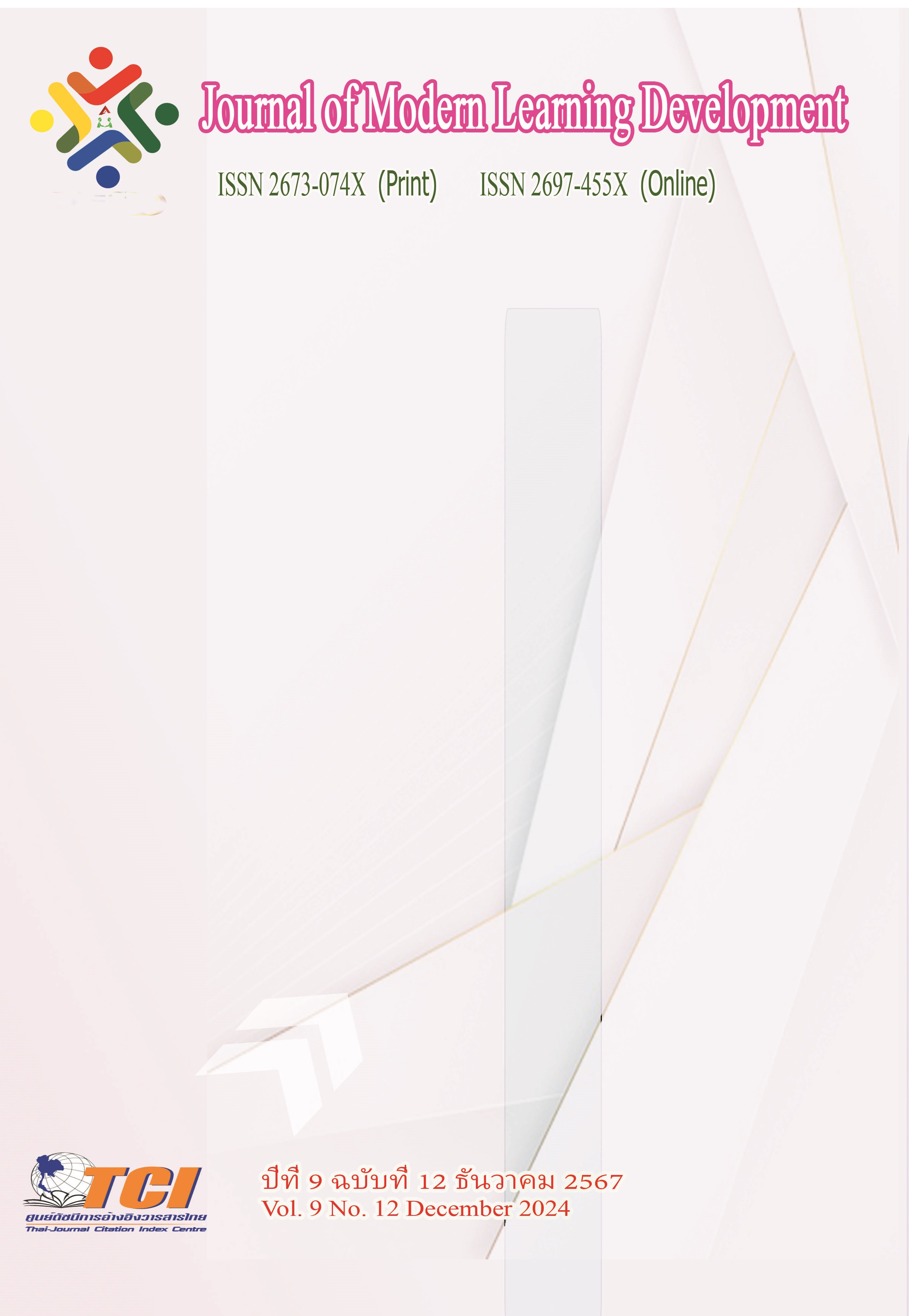The Development Learning Achievement and Mathematical Process Skills on Decimals by Using Problem-Based Learning Model Combined with Deductive Teaching for Grade 5 Students
Main Article Content
Abstract
This research is aimed to 1) develop learning achievement on decimals by
using problem-based learning model combined with deductive teaching for grade 5 student with the average score must be not less than 70 percent and the number of students who pass the criteria is 70 percent or more 2) develop mathematical process skills on decimals by using problem-based learning model combined with deductive teaching for grade 5 student with the average score must be not less than 70 percent and the number of students who pass the criteria is 70 percent or more. The target group is 15 students in grade 5 at Bandonsomhong Witthayakhom School, semester 2, academic year 2021, by purposive sampling. Tools used: 1) 6 Mathematics lesson plans on decimals, for 12 hours. 2) 10 questions of subjective test on Mathematics Process Skills of Decimals, and 3) Academic Achievement Test, 4 options, 30 questions. Statistics used in data analysis include; mean standard deviation and percentage.
The research results were found that:
1. Learning achievement of Grade 5 students after used problem-based learning combined with deductive teaching techniques, students had an average score of 24.07 out of 30, that is 80.23 percent, and there were 13 students who passed the criteria, it is 86.67 percent of the total number of students, which meets the specified criteria.
2. Mathematical process skills of Grade 5 students after used problem-based learning activities combined with deductive teaching techniques, students had an average mathematical process skill score of 14.93 out of 20, that is 74.67 percent, and there were 13 students who passed the criteria, it is 86.66 percent of the total number of students, which meets the specified criteria.
Article Details
References
เอกสารอ้างอิง
กนกวลี อุษณกรกุล. (2551). คณิตศาสตร์ ม.2 เล่ม 1.กรุงเทพฯ: อักษรเจริญทัศน์.
กระทรวงศึกษาธิการ. (2551). หลักสูตรแกนกลางการศึกษาขั้นพื้นฐาน พุทธศักราช 2551. กรุงเทพฯ: คุรุสภา.
กัญจน์วิภา ใบกุหลาบ. (2562). ผลการจัดกิจกรรมการเรียนรู้โดยใช้ปัญหาเป็นฐานที่มีต่อความสามารถในการแก้ปัญหาทางคณิตศาสตร์และผลสัมฤทธิ์ทางการเรียนคณิตศาสตร์ เรื่อง สมการ ของนักเรียนชั้นประถมศึกษาปีที่ 6. ปทุมธานี: ครุศาสตรมหาบัณฑิต หลักสูตรและการสอน มหาวิทยาลัยราชภัฏวไลยอลงกรณ์ ในพระบรมราชูปถัมภ์.
จิรนันท์ พึ่งกลั่น. (2555). ผลของการจัดกิจกรรมการเรียนรู้โดยใช้ปัญหาเป็นฐาน ที่มีต่อความสามารถในการแก้ปัญหาทางคณิตศาสตร์ ของนักเรียนชั้นมัธยมศึกษาปีที่ 3 โรงเรียนบ้านค่าย. ปริญญาศึกษาศาสตรมหาบัณฑิต (การสอนคณิตศาสตร์) สาขาวิชาการสอนคณิตศาสตร์ ภาควิชาการศึกษา.มหาวิทยาลัยเกษตรศาสตร์,กรุงเทพฯ.
ทิศนา แขมณี. (2564). ศาสตร์การสอน. กรุงเทพฯ: ด่านสุธาการพิมพ์
โรงเรียนบ้านดอนส้มโฮงวิทยาคม. (2560). รายงานการประเมินตนเองประจำปีของสถานศึกษา ปีการศึกษา 2562: โรงเรียนบ้านดอนส้มโฮงวิทยาคม.
สถาบันส่งเสริมการสอนวิทยาศาสตร์และเทคโนโลยี. (2551). มาตรฐานการเรียนรู้คณิตศาสตร์. กรุงเทพมหานคร:สถาบันส่งเสริมการสอนวิทยาศาสตร์และเทคโนโลยี.
สำนักงานเลขาธิการสภาการศึกษา. (2550). การจัดการเรียนรู้แบบใช้ปัญหาเป็นฐาน. กรุงเทพมหานคร: ชุมนุมสหกรณ์การเกษตรแห่งประเทศไทย จำกัด.
สุวิทย์ มูลคำ และอรทัย มูลคำ. (2547). การสอนแบบนิรนัย. กรุงเทพมหานคร: ภาพพิมพ์.
อุบลวรรณ ปัญนะ. (2557). ผลการจัดกิจกรรมการเรียนรู้แบบใช้ปัญหาเป็นฐานร่วมกับเทคนิคห้องเรียนกลับทาง ที่มีต่อความสามารถในการแก้ปัญหาทางคณิตศาสตร์ เรื่อง สมการ ของนักเรียนชั้นประถมศึกษาปีที่ 5. สาขาวิชาวิทยาศาสตร์ศึกษา (แขนงวิชาคณิตศาสตร์ศึกษา) มหาวิทยาลัยนเรศวร.


